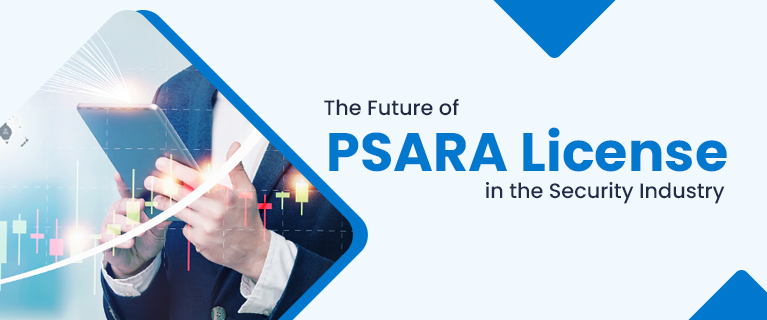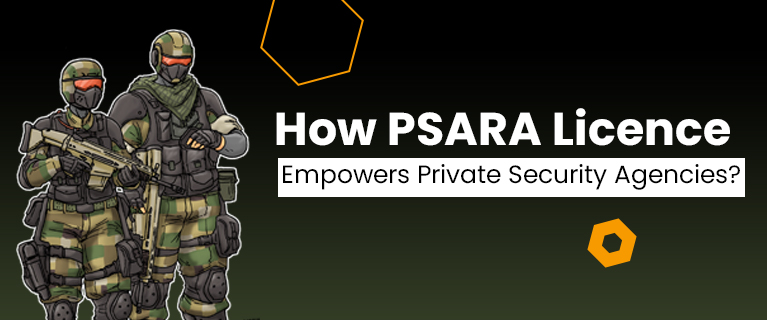What are the Essential Conditions of PSARA License?
Private Security Agencies play a crucial role in ensuring safety and security in various sectors, including commercial establishments, residential complexes, and events. In India, the functioning of private security agencies is regulated by the Private Security Agencies Regulation Act (PSARA), which requires agencies to obtain a PSARA License. This licence ensures that private security agencies meet certain essential conditions and adhere to specific guidelines to maintain professionalism and efficiency in their operations. In this blog, we will discuss the essential conditions of the PSARA License and their significance in the private security industry.
Read also this -: Benefits of Acquiring a PSARA License1. Eligibility Criteria:
To obtain a PSARA License, a private security agency must fulfil certain eligibility criteria. These criteria typically include factors such as the agency's legal status, a minimum number of personnel with relevant qualifications, compliance with labour laws, and financial stability. The eligibility criteria ensure that only credible and capable agencies are granted the licence, promoting professionalism and accountability in the private security industry.
2. Adequate Infrastructure:
Private security agencies are required to have adequate infrastructure to support their operations effectively. This includes having a registered office with appropriate facilities for training, administration, and coordination. The agency should have a designated control room equipped with the necessary communication systems to ensure effective monitoring and response to security incidents. Adequate infrastructure is crucial for the smooth functioning and professionalism of private security agencies.
3. Trained Security Personnel:
Private security agencies must employ trained security personnel who meet the prescribed qualifications and standards. These personnel should possess the necessary skills and knowledge to handle various security challenges effectively. The PSARA License requires agencies to ensure that their security personnel undergo comprehensive training programs, including modules on physical security, access control, emergency response, and customer service. The presence of well-trained security personnel enhances the credibility and effectiveness of private security services.
4. Background Verification:
One of the essential conditions of the PSARA License is conducting thorough background verification of security personnel. Private security agencies must verify the credentials, character, and antecedents of their employees to ensure their suitability for the job. Background verification helps maintain the integrity of the private security industry by preventing the employment of individuals with criminal records or questionable backgrounds. It enhances the trust and reliability associated with private security agencies.
5. Compliance with Labor Laws:
Private security agencies must comply with labour laws and regulations to protect the rights and welfare of their employees. This includes adhering to minimum wage requirements, providing appropriate working conditions, and ensuring timely payment of wages. Compliance with labour laws fosters a fair and ethical work environment, enhances employee morale, and promotes sustainable employment practices within the private security sector.
6. Insurance Coverage:
Private security agencies are required to provide insurance coverage for their security personnel. This includes providing medical insurance, accident insurance, and personal injury insurance. Insurance coverage protects the interests of security personnel and provides financial security in the event of an unforeseen incident or injury. It demonstrates the agency's commitment to the well-being and safety of its employees, contributing to a more secure and reliable private security industry.
7. Compliance with Code of Conduct:
Private security agencies must adhere to a code of conduct as prescribed by the PSARA Act. This code of conduct outlines ethical practices, professional behaviour, and responsibilities of the agency and its personnel. Compliance with the code of conduct ensures that private security services are provided in a lawful, responsible, and ethical manner. It builds trust and confidence among clients and stakeholders, contributing to the overall professionalism of the private security industry.
8. Security Audit:
To maintain the validity of the PSARA License, private security agencies must undergo regular security audits. These audits evaluate the agency's compliance with the prescribed guidelines, infrastructure standards, training requirements, and operational procedures. Security audits help identify areas for improvement and ensure that the agency continues to meet the essential conditions of the PSARA License. They promote accountability, quality assurance, and continuous enhancement of services.
9. Reporting and Record-Keeping:
Private security agencies must maintain accurate records and submit regular reports to the appropriate authorities. This includes maintaining records of security personnel, clients, training programs, incidents, and other relevant information. The reporting and record-keeping requirements contribute to transparency, accountability, and effective regulation of the private security industry. They enable authorities to monitor compliance and take necessary actions to address any non-compliance or misconduct.
10. Collaboration with Law Enforcement Agencies:
Private security agencies are expected to collaborate and cooperate with law enforcement agencies in maintaining law and order. This includes providing support during investigations, sharing relevant information, and adhering to guidelines issued by law enforcement authorities. Collaboration with law enforcement agencies strengthens the overall security infrastructure and ensures effective coordination between private security agencies and the government.
Read also this -: How to Apply Online for a PSARA LicenseConclusion
The PSARA License imposes several essential conditions on private security agencies to ensure professionalism, quality, and accountability in the industry. These conditions cover various aspects, including eligibility criteria, infrastructure, trained personnel, background verification, compliance with labour laws, insurance coverage, code of conduct, security audits, reporting, and collaboration with law enforcement agencies. By adhering to these conditions, private security agencies contribute to a safer and more secure environment while upholding ethical standards and protecting the rights and welfare of their employees. The PSARA License serves as a mechanism to regulate and enhance the private security industry, instilling confidence in clients and stakeholders and promoting responsible and efficient private security services.




Comments
Post a Comment